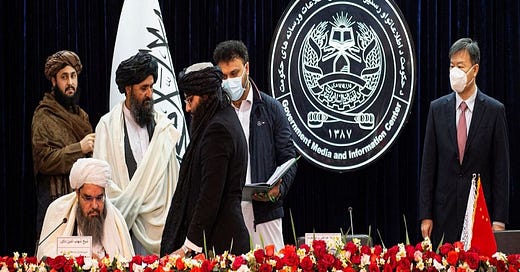China’s Oil Production Deal With Afghanistan Is Mutually Beneficial
What Afghanistan urgently needs isn’t more lectures about its internal affairs or military threats, but someone credible like China who sincerely believes in its people’s ability to reconstruct their country.
Thursday saw tangible progress in rebuilding the Afghan economy after that country signed an oil production deal with China’s Xinjiang Central Asia Petroleum and Gas Company. Bloomberg quoted Acting Minister Of Mines and Petroleum Shahabuddin Delawar who said that China “will invest as much as $150 million in the first year and $540 million over the subsequent three years to explore five oil and gas blocks.” Afghanistan will also “earn 15% royalty fees from the 25-year contract.”
Although China doesn’t formally recognize its partner’s de facto Taliban leaders, it nevertheless continues to pragmatically engage with them as proven by the latest development. Their oil production deal is mutually beneficial since it advances China’s energy diversification strategy in parallel with providing jobs for average Afghans and bolstering their country’s self-sufficiency. It also demonstrates that the People’s Republic aspires to play a leading role post-war Afghanistan.
This is the first major international contract signed since the withdrawal of Western forces in August 2021. Although Afghanistan is better known for its estimated $1-3 trillion worth of untapped mineral resources than it is for its energy ones, it’s still important for its authorities to obtain reliable revenue that could then be invested in other industries as well as their people’s overall development needs. Nevertheless, most investors have thus far stayed away from Afghanistan for three primary reasons.
First, the Taliban’s socio-political agenda is at odds with the international expectations that it would ensure women’s right to an education and eventually assemble a truly inclusive government. Second, the security situation remains difficult due to the continued presence of the Islamic State Khorasan Province terrorist group, among others. And finally, large amounts of money must be invested in Afghan projects since its infrastructure was largely destroyed over the past forty years of almost non-stop war.
China’s evolving approach to these three challenges is pragmatic. By investing so immensely in Afghanistan’s oil production, Beijing is signaling that it has faith that the Taliban will successfully overcome those aforementioned obstacles. The revenue that the country’s de facto leaders will receive from this deal can be invested in other socio-economic projects for improving its people’s living standards if the Taliban has the political will to do so, which is ideally the case.
That would further contribute to Afghanistan’s sustainable reconstruction, while investing some of those funds in bolstering their forces’ anti-terrorist capabilities could help allay regional fears about the security situation spiraling out of control. Taken together, gradual progress on the socio-economic and security tracks indirectly fueled by the financial support provided to the country from China’s oil production deal could encourage others to invest there as well.
The demonstration effect caused by China’s major investment in Afghanistan could therefore be the most important outcome of this agreement with time. The People’s Republic is widely respected for its successful long-term planning, especially when it comes to the mutually beneficial deals clinched with its partners, so it therefore follows that this scenario might be a lot closer to reality than most observers realize instead of the wishful thinking that they might initially be inclined to consider it to be.
With this in mind, China’s oil production deal with Afghanistan should be praised by all those who sincerely support that war-torn country’s sustainable reconstruction. Beijing is betting that everything will eventually improve there and believes that its major investment can catalyze this positive process. What Afghanistan urgently needs isn’t more lectures about its internal affairs or military threats, but someone credible like China who sincerely believes in its people’s ability to reconstruct their country.




